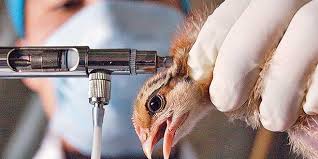
不完备疫苗助长高毒性病毒
"Imperfect" Vaccines May Aid Survival of Ultrahot Viruses
不完备疫苗助长高毒性病毒
Certain vaccines prevent sickness and death, but don't block transmission—meaning they may actually give some viral strains an extra shot at survival. Christopher Intagliata reports
一些疫苗虽然可以防止疾病与死亡的发生,但是却不能阻断传播,这意味着它们也许会给病毒另外的生路。
撰文/播音 克里斯多夫·因塔利亚塔(Christopher Intagliata)
翻译 李轩
In the 1960s a cancer-causing herpes virus was ravaging the poultry industry. The virus caused what's called Marek's disease—and killed 1 to 2 percent of the birds. "Given that there are billions of birds in the industry, that's a lot of birds." Andrew Read, an evolutionary biologist at Penn State University. He says the virus was easy to catch. "The dander of chickens if full of the virus. If you shake a chicken, the virus drops out."
20世纪60年代,一种可以致癌的疱疹病毒席卷了家畜行业。这种病毒引发的马莱克氏病杀死了1%-2%的家禽。“对于有着几十亿只家禽的产业来说,这是一个不小的数字。”安德鲁?里德说。他是宾州州立大学的一名进化生物学家。他说这种病毒很常见,“它就像头皮屑,只要你把一只鸡抖一抖,病毒就会掉出来。”
Then, in 1970 a new vaccine put an end to most of the deaths. But the poultry vaccine, unlike most, was a so-called "leaky" or "imperfect" vaccine. "The vaccine is lifesaving, but it allows the infection to persist and transmit from the host." Meaning you could still shake a vaccinated chicken—and make it rain viruses.
接着到了1970年,一种新型疫苗问世,从而结束了这场浩劫。但是这个禽类疫苗与普通疫苗不同,它是一种被称为“弱疫苗”或“不完备疫苗”的疫苗。这种疫苗可以防止死亡,但是病毒却可以从宿主传播出来。这意味着你抖一抖接种的鸡,依然毒如雨下。
Now, Read and his colleagues have shown that these leaky vaccines may actually give some viral strains an evolutionary leg up. Because the most virulent strains usually wipe out unvaccinated birds in just 10 days—not enough time for the birds to infect many others. These viruses are essentially so "hot" they burn themselves out. But vaccinated birds survive infection with the hot virus, and shed it for weeks—allowing strains that would otherwise die out to stick around, and kill any unprotected birds. The study appears in the journal PLoS Biology. [Andrew F. Read et al, Imperfect Vaccination Can Enhance the Transmission of Highly Virulent Pathogens]
里德和他的同事发现这些弱疫苗实际上会帮助一些毒株进化。因为大多数强毒性病毒会在10天内将宿主杀死,这么短的时间病毒来不及转移到下一宿主,它们都是作茧自缚。但接种的禽类在感染后依然可以存活,并携带病毒数周,这使得病毒有足够时间传染到下一宿主,这会杀死那些没有接种的禽类。研究发表在了PLoS Biology期刊上。
Of course, none of this is reason to doubt the efficacy of vaccines. "Vaccines have been one of the most important public health interventions. And the most cost effective we've ever had. And they're critically important in food chain security as well. So vaccines themselves are fantastic." But several imperfect vaccines for malaria are currently being tested. If they're approved, he says, we'll need to use other measures, like bed nets, to block transmission—remembering that not all vaccines are a one-shot deal.
当然,这并不是说我们就应该怀疑疫苗的功效。就目前而言,疫苗仍是公共健康最重要的保障之一。它是性价比最高的一种方式,在食物链安全也占据着重要地位。所以疫苗是一位巨大的功臣。不过一些仍处于测试中的针对疟疾的不完备疫苗一旦得到批准,就会使还未接种的人不得不采取一些应对措施,比如安装蚊帐,来防止传播。所以请记住,并不是所有疫苗都是一锤子买卖!
未经书面许可任何人不得复制或镜像
京ICP备11000850号-1
 京公网安备11010502039775号
京公网安备11010502039775号 信息网络传播视听节目许可证0111611号
国家科技基础条件平台

















